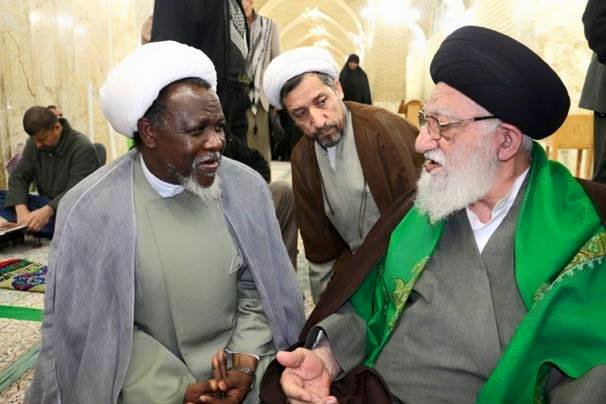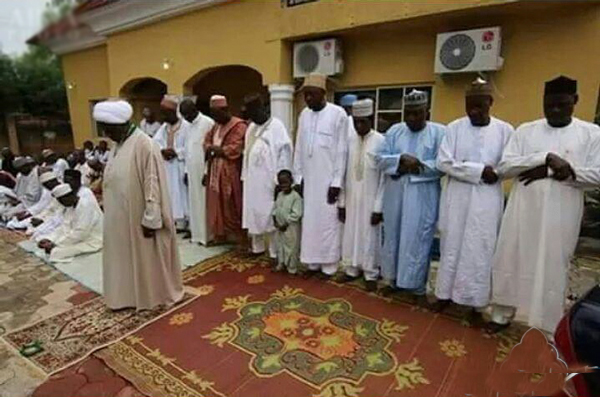“Never again, shall the people tolerate oppression and oppressors; never again, shall things be the same” Stated by Sheikh Ibrahim Zakzaky.
Born
Sheikh Ibrahim Yaghoub Zakzaky was born in a Maleki Family on May 5, 1953 (15 Sha’aban 1372 A.H) in Zaria, northeastern Nigeria.
His Family
The word Al-Zakzaky is a familiar title meaning ‘Man from Zazzau’, a city in Northern Nigeria known for religious studies and a haven of religious clerics.
The genealogy of Zakzaky is as follows: He is the son of Aliyu, son of Tajuddeen, son of Imam Hussain. Imam Hussain originated from Mali, and came to Sokoto during the time of Mujaddid Sheikh Usman bin Fodiyo, and became his student, following which the Sheikh attached Imam Hussain with the Amir and standard bearer of Islamic Jihad, whose name was Mallam Musa, in order to establish an Islamic government in Zazzau Province. When Zazzau was defeated, Mallam Musa became the Amir and Imam Hussain became his Religious Adviser. There were intermarriages between their families. This happened in the early part of the 19th century.
The father of Sheikh Ibrahim Zakzaky died in 1972. He is the fifth born of his father.
He is married to Malama Zeenah, whom he met in the university in the course of religious activities. They are blessed with nine children, seven sons and two daughters; Muhammad, Ahmad. Mahmoud, Hamid, Hamd, Humayd, Ali Heydar, Nasiba and Soheyla.
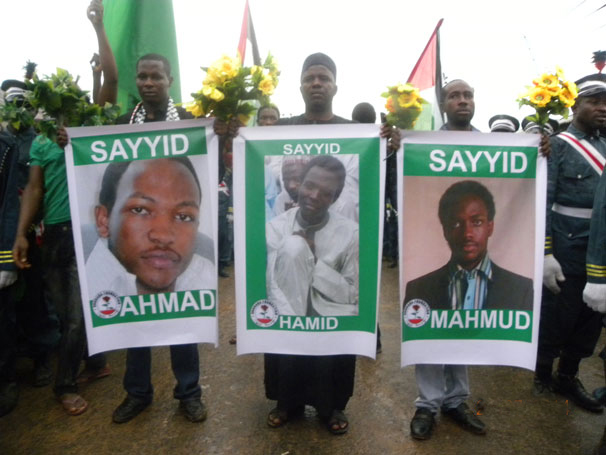
His three sons Sayyed Mahmoud, Sayyed Hamid and Sayyed Ahmad were martyred during Quds Day Rally 2014. 24-year-old Sayyed Ahmad is a final Year Student of Chemical Engineering University of Chenyang University China; Sayyed Hamid (22-year-old) is a first year undergraduate in the department of Aeronetical Engineering of University of Xian, China while Sayyed Mahmoud (19-year-old) is a student of Almustafa International University, Lebanon. Sheikh Zakzaky gave a speech on his sons funeral ritual.
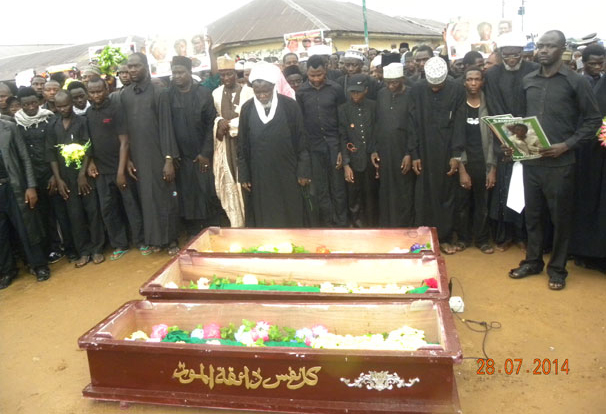
According to a rights advocacy group, Massoud Shadjareh, with the London-based Islamic Human Rights Commission (IHRC), three other sons of Sheikh Zakzaky ( Hamd, Humayd and Ali Heydar) were martyred, another his son, daughter and wife were injured in the Nigerian army’s attack on the cleric’s house on December 12, 2015.
Early Education
He had his earliest education at the traditional Quranic and Islamic Schools from when he was very tender to when he was sixteen years of age. He started his formal education at Provincial Arabic School Zaria in the year 1969. In the year 1971, he was admitted into the School for Arabic Studies (SAS), Kano, where he was until 1975. The school was founded in 1934 as a law school for the Northern Nigeria, and is the foundation for what is today known as Bayero University. Most Grand Khadis from the Northern Nigeria are products of this school.
Advance Education
Sheikh Zakzaky sat for Advanced Level GCE in Government, Economics, Hausa and Islamic Studies in the year 1975. Coming out successfully from the examination, he qualified for a direct entry into the Ahmadu Bello University (ABU), Zaria where he studied Economics, between 1976 and 1979.
While in the university, Sheikh Ibraheem Zakzaky was an active member of the Muslim Student Society (MSS) both at the campus and national levels.
Becoming the Secretary of ABU
As at the year 1978, Zakzaky had become the Secretary – General of the Muslim Student Society (ABU), as such, he is believed to be the person that pushed for the inclusion of Shari’ah in the Nigerian Constitution. This he achieved through the nation-wide demonstrations he organized in support of the inclusion of Shari’ah in the Nigerian constitution. In 1979, he became the Vice-President (International Affairs) of the Muslim Student Society.
Religious Education
Sheikh Zakzaky also understudied different ulamas in the traditional system of learning, both in Kano and Zaria. The people that taught him in Zaria includes Malam Sani Abdulkadir, Malam Isa of Madaka, Malam Sani Na’ibi and Malam Ibrahim of Kakaki. In Kano he studied under Shawish Abdallah of Sagagi and Malam Nuhu the Imam of Yola. Right from the time he was a student, Zakzaky have chosen Islamic Scholarship and activism as his main occupation. He engages most of the times in learning, research and teaching Islamic studies. His speeches have been compiled into books written in Hausa Language.
Meeting with Imam Khomeini (R.A)
He was a Maliki at first. He met Imam Khomeini (R.A.) in Paris and a year after the revolution in 1980, when he was an economics student at the University of Zaria, came to Iran as the Deputy Secretary General of the Muslim Students of Africa and visited and talked to Imam Khomeini. In that meeting, Imam gave him a Quran and said, “Go and guide the people of your country with Quran.” After that meeting, he was much influenced by Shia school of thought and became a Shiite.
Nigeria Shia Population Increases by Sheikh Zakzaky Propagation
Although before the Islamic Revolution, the number of Shiites in Nigeria was few, after the revolution and with the leadership of Sheikh Zakzaky Nigeria became one of the most Shiite populous countries of the world. Shiites in Nigeria who became Shiite through Sheikh Zakzaky and greatly respect the revolution, Imam and the Supreme Leader are known as Khomeiniyoun in Africa.
Imprisoned
Sheikh Zakzaki’s activities have frightened the American, Israeli and Wahhabi Intelligence services so much so that he has been imprisoned for 9 times, the last of which was from 1996 to 1998. He has been jailed on several occasions on account of his ideas by different Nigerian regimes, beginning from the time of the military administration of Olusegun Obasanjo up to the time of Abacha/Abubakar. Under the Goodluck Jonathans administration, his group crashed with the Nigerian Army, leading to the loss of his relations. Under President Muhammadu Buhari as a civilian president, the Army clashed with his followers, leading to loss of lives of several of the sect members. In all these periods, charges against him were always sedition or inciting disaffection to Government. Under Abacha regime, it was alleged that he declared that “there is no government except that of Islam”. He has spent a total of about nine years in prison in nine different prisons across Nigeria. The most notable was that of Enugu where he was jailed from 1981 to 1984. He was at the notorious Interrogation Center of NSO, Lagos between 1984 and 1985, Kiri-Kiri Maximum Security in 1985, Portharcout from 1987 to 1989 and 1996 to 1997, then Kaduna in 1987, and 1997 to 1998.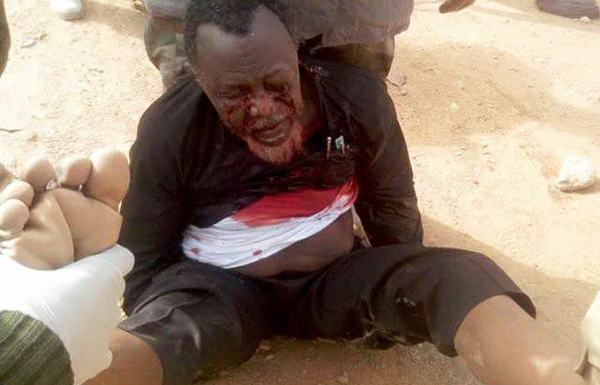
On December 12, 2015, Nigerian soldiers attacked Shia Muslims attending a ceremony at a religious center in Zaria, accusing them of blocking the convoy of the army’s chief of staff and attempting to assassinate him. The Shias have categorically denied the allegations.
The following day, Nigerian forces also raided Zakzaky’s home and arrested him after reportedly killing those attempting to protect him, including one of the Islamic Movement of Nigeria (IMN)’s senior leaders and its spokesman.
The two attacks led to the deaths of hundreds of members of the religious community, including three of Zakzaky’s sons.
Sheikh Zakzaky’s Condition Improved
Professor Dahiru Yahaya, member of the Nigerian Supreme Council for Islamic Affairs, who has visited Sheikh Zakzaky on January 2016 said that the condition of Sheikh Zakzaky has improved.
Professor Dahiru Yahaya of Bayero University Kano (BUK), said he was told by the cleric that he was severely wounded after the soldiers fired six bullets at him. The academic made the remarks in an interview with Hausa Radio.
America in the Eyes of Sheikh Zakzaky
Since the September 11, 2001 terrorist attack in the United States, there has been review and redefinition of the word “terrorism” in global politics. In 2002 and 2004, the Civil Rights Congress in Kaduna organized a seminar a year after the incident with many academicians and clergies of different faiths in attendance. The views expressed by Sheikh Zakzaky on the issue and his definition of terrorism were unprecedented. Through logical argument and giving empirical evidences, he was able to convince his listeners that, “America is number one terrorist nation in the world”.
An American “journalist” who traveled all the way from the United States to interview the Sheikh asked: “If you had the chance to sit with the President of the United States, what would you say to him?” Sheikh Zakzaky replied: “I will ask him to mind his business, to consider the general welfare and morality of the people of the United States and not to mettle in the affairs of other countries”. Sheikh Zakzaky is a man who never hides his feelings on anything, just as how his views about each government in Nigerian and other supposed “strong” governments in the Western world remain constant. The following exchange between Sheikh Zakzaky and the American “journalist” says much about his personality:
Interviewer: “How does it make you feel that the Americans are getting closer to Nigeria, by deploying troops on the country’s coastal shore?”
Sheikh Zakzaky: “Well, I think they are coming here to rob oil they have been robbing in other places. They have occupied Iraq in order to rob. In essence, they are armed robbers!”
Interviewer: “The United States are armed robbers?”
Sheikh Zakzaky: “What else are they? They have robbed oil and they are robbing oil in Iraq, they are coming here to rob!”
Sheikh Zakzaky and Islamic Government
In a lecture given at Bayero University, Kano in December 1999, Sheikh Zakzaky tried to clarify his position toward sharīʿa. After defining the word sharīʿa, he classified Islamic countries applying sharīʿa into three major categories:
- Traditional ones that applied the sharīʿa for a long time that were hardly colonized by western colonialists.
- Countries that applied sharīʿa partially: these countries have been colonized and after independence they started practicing a ‘post-colonial system of democracy’.
- Finally, countries where the sharīʿa is total and where an Islamic revolution take place.
After giving the examples of Pakistan, Sudan and finally of Iran, Sheikh zakzaky came to the conclusion that sharīʿa was successful only in Iran because it is under an Islamic state. He sees the success of a full sharīʿa implementation only within a system of government which is ‘purely Islamic’. Concerning Nigeria, Sheikh Zakzaky predicts two conflicts when the sharīʿa is applied: “one conflict will be with the constitution which will claim superiority over the sharīʿa and will, therefore, place the sharīʿa under its control and regulations. The Other conflict will be the sharīʿa itself which, as the Law of Almighty God, claims superiority over all laws and wherefore cannot accept the supremacy of the Nigerian constitution.
Sheikh Zakzaky concludes by saying that the application of sharīʿa under a government system which is not Islamic will subject it (sharīʿa) to ‘restrictions, manipulations and possible abuse’.
Islamic Awakening from Sheikh Zakzaky’s Point of View
“never again, shall the people tolerate oppression and oppressors; never again, shall things be the same”
Sheikh Zakzaky regarding the Islamic Awakening said that, the current revolt across the Middle East and North Africa has clearly demonstrated the strong will of the people to break away from the decade of domination and suppression.
According to him, people are becoming more aware of the rights and cannot therefore watch as the right is being plundered through collaborated domination. “This is the beginning, and there is no stopping it,” he added.
Sheikh Zakzaky however, cautioned on the hijack of the revolution by the West through interventionist strategy: “For instance you may succeed in removing Mubarak, and they will give you another Mubarak”.
He therefore advised the Islamic nations to have a clear agenda and firm leadership that will replace the existing statuesque. “The vision and agenda must clearly be stated, should clearly be Islamic”, he stressed.
On the issue of leadership, sheikh Zakzaky stressed that the Muslim Umma had been one nation under one leadership, with strategic delegations. “During the lifetime of Prophet Muhammad (SAWA), he was the absolute leader and with vested divine authority that was delegated after him”.
Sheikh Zakzaky added that, it is a clear fact that the current wave of revolutionary movements around the world was inspired by the Islamic revolution in Iran led by late Imam Khomeini(QS), making him the leader of all times.
“You cannot talk of Imam Khomeini being a past leader, he is still the leader. You cannot talk of contries having their own type of Khumeini leader. The world needs only one Khumeini and it has one. Imam Khumeini is God’s gift to the world, the world only needs to follow the thought and teachings of Imam Khumeini”.
Sheikh Zakzaky stated Imam Khomeini remains a model and a leader with his successor Sayyed Ali Khamene’i in place, whom he said has clearly pointed out the way forward in the current situation during his opening speech at the International Islamic Awareness Conference.
An Unpublished Interview with Sheikh Zakzaky in Mashhad, Iran 2015
Sheikh Zakzaky, during his visit to Mashhad and his presence in the 13th International Festival of Imam Reza (A.S), had an interview with Shamstoos Website. The following is a part of this unpublished speech presented:
In his speech about Imam Reza (A.S.), Sheikh Zakzaky said, “Speaking about Imam Reza (A.S.), or what is known about him is not only limited to books, articles and conferences and people and buildings in which we live. We should, according to Imam Reza (A.S.) himself, institutionalize his behavior in ourselves. This practice should be reflected in our behavior. It is much more important. Politeness, Jihad, rationality, effort, patience, etc. are the points we must learn and act upon.”
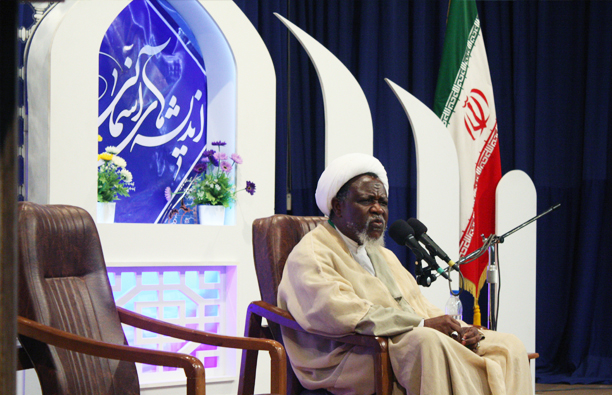
“When we go back to our own countries, we should apply the Holy Imam Reza’s (A.S.) statement that ‘God bless the one who would revive us.’ When he was asked what he would order, and Imam said, ‘Learn the gist of our words and teach to people because if people hear the beauty of our words and know them, they will definitely follow us’.” he also continued.
Nigeria Shiite leader also said, “We have two resuscitations in the life of all Imams, one at the time of Imam Hussein (A.S.) and the other one at Imam Reza (A.S.)’s time. Imam Reza (A.S.) in the course of his life revived religion and it coincided the time when deviant thoughts have entered the world of Islamic ideology. Imam Reza (A.S.) came to Khorasan and chose this land for migration, in fact, his presence in Mashhad was divine wisdom, and God wanted him to come to this land to live in exile and to be martyred there and to be buried in a foreign land. These were all divine wisdom.”
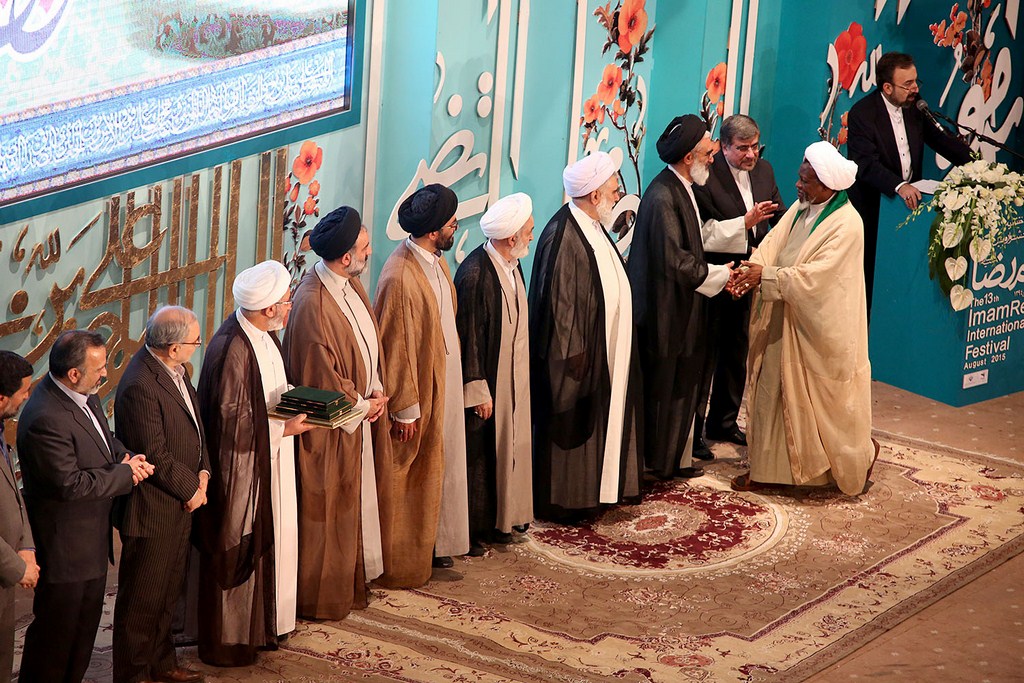
“Lord brought the Savant of Muhammad (A.S.) family to this country and I believe that Imam Reza (A.S.) set foot to Khorasan to destroy many deviant ideas that had dominated the Islamic world, such as distortion of Judaism and Christianity, etc. Wrong ideas that are still ongoing, points such as the Shiites’ Quran is falsified or some believing that Quran was not revealed to the Prophet” he continued.
Extremely popular Cleric in Nigeria also said, “Tension and violence have reached their peak in the world, but the logic of Imam Reza (A.S.) is the logic of dialogue and reason, and in our time, Islamic Republic of Iran, inspired by Razavi wisdom and culture, moves forward and succeeds. By enjoying Razavi rationality and culture, Islamic Republic solved the nuclear issue on the table and this is the message that we must carry with us into our countries.”
 Ijtihad Network Being Wise and Faithful Muslim in the Contemporary World
Ijtihad Network Being Wise and Faithful Muslim in the Contemporary World
